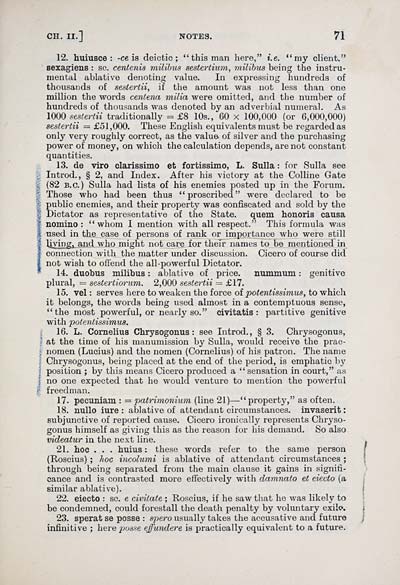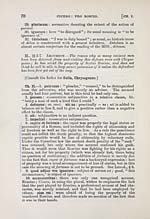Download files
Complete book:
Individual page:
Thumbnail gallery: Grid view | List view

CH. II.] NOTES. 71
12. huiusce : -ce is deictic ; " this man here," i.e. "niy client."
Bexagiens : sc. centenis milibus sestertium, milibus being the instru-
mental ablative denoting value. In expressing hundreds of
thousands of sestertii, if the amount was not less than one
million the words centena milia were omitted, and the number of
hundreds of thousands was denoted by an adverbial nuineral. As
1000 sestertii traditionally =£8 lOs., 60 x 100,000 (or 6,000,000)
sestertii = £51,000. These English equivalents must be regardedas
only very roughly correct, as the value of silver and the purchasing
power of money, on which the calculation depends, are not constant
quantities.
13. de viro clarissimo et fortissimo, L. Sulla : for Sulla see
Introd. , § 2, and Index. After his victory at the Colline Gate
; (82 B.C. ) Sulla had lists of his enemies posted up in the Forum.
{■ Those who had been thus "proscribed" were declared to be
1% public enemies, and their property was confiscated and sold by the
I Dictator as representative of the State. quem honoris causa
I nomino : " whom I mention with all respect." This formula was
I nsed in the case of persons of rank or impprtance who were still
Uving, and who might not care for thefr names to be mentioned in
connection with the matter ixnder discussion. Cicero of course did
not wish to ofiend the all-powerful Dictator.
14. duobus milibus : ablative of price. niunmimi : genitive
plural, = sestertiorum. 2,000 sestertii = £17.
15. vel : serves here to weaken the force of ^o<en<ess»mMS, to which
it belongs, the words being used almost in a contemptuous sense,
"the most powerful, or nearly so." civitatis : partitive genitive
with potentissimus.
16. L. Comelius Chrysogonus : see Introd., § 3. Chrysogonus,
ftt the time of his manumission by Sulla, would receive the prae-
nomen (Lucius) and the nomen (Cornelius) of his patron. The name
Chrysogonus, being placed at the end of the period, is emphatic by
, position ; by this means Cicero produced a " sensation in court," as
} no one expected that lie would venture to mention the powerful
-' freedman.
17. pecuniam : =patrimonium (line 21) — "property," as often.
18. nuUo iure : ablative of attendant circumstances. invaserit :
Bubjunctive of reported cause. Cicero ironically represents Chryso-
gonus himself as giving this as the reason for liis demand. So also
videatur ia the next line.
21. hoc . . . huius : these words refer to the same person
(Roscius) ; hoc incolumi is ablative of attendant circumstances ;
through being separated from the main clause it gains in signiti-
cance and is contrasted more effectively with damnato et eiecto (a
similar ablative).
22. eiecto : sc. e civitate ; Roscius, if he saw that he was likely to
be condemned, could forestall the death penalty by voluntary exil^.
23. sperat se posse : spero usually takes the aecusative and future
infinitive ; here^os.se effiindere is practically equivalent to a future.
12. huiusce : -ce is deictic ; " this man here," i.e. "niy client."
Bexagiens : sc. centenis milibus sestertium, milibus being the instru-
mental ablative denoting value. In expressing hundreds of
thousands of sestertii, if the amount was not less than one
million the words centena milia were omitted, and the number of
hundreds of thousands was denoted by an adverbial nuineral. As
1000 sestertii traditionally =£8 lOs., 60 x 100,000 (or 6,000,000)
sestertii = £51,000. These English equivalents must be regardedas
only very roughly correct, as the value of silver and the purchasing
power of money, on which the calculation depends, are not constant
quantities.
13. de viro clarissimo et fortissimo, L. Sulla : for Sulla see
Introd. , § 2, and Index. After his victory at the Colline Gate
; (82 B.C. ) Sulla had lists of his enemies posted up in the Forum.
{■ Those who had been thus "proscribed" were declared to be
1% public enemies, and their property was confiscated and sold by the
I Dictator as representative of the State. quem honoris causa
I nomino : " whom I mention with all respect." This formula was
I nsed in the case of persons of rank or impprtance who were still
Uving, and who might not care for thefr names to be mentioned in
connection with the matter ixnder discussion. Cicero of course did
not wish to ofiend the all-powerful Dictator.
14. duobus milibus : ablative of price. niunmimi : genitive
plural, = sestertiorum. 2,000 sestertii = £17.
15. vel : serves here to weaken the force of ^o<en<ess»mMS, to which
it belongs, the words being used almost in a contemptuous sense,
"the most powerful, or nearly so." civitatis : partitive genitive
with potentissimus.
16. L. Comelius Chrysogonus : see Introd., § 3. Chrysogonus,
ftt the time of his manumission by Sulla, would receive the prae-
nomen (Lucius) and the nomen (Cornelius) of his patron. The name
Chrysogonus, being placed at the end of the period, is emphatic by
, position ; by this means Cicero produced a " sensation in court," as
} no one expected that lie would venture to mention the powerful
-' freedman.
17. pecuniam : =patrimonium (line 21) — "property," as often.
18. nuUo iure : ablative of attendant circumstances. invaserit :
Bubjunctive of reported cause. Cicero ironically represents Chryso-
gonus himself as giving this as the reason for liis demand. So also
videatur ia the next line.
21. hoc . . . huius : these words refer to the same person
(Roscius) ; hoc incolumi is ablative of attendant circumstances ;
through being separated from the main clause it gains in signiti-
cance and is contrasted more effectively with damnato et eiecto (a
similar ablative).
22. eiecto : sc. e civitate ; Roscius, if he saw that he was likely to
be condemned, could forestall the death penalty by voluntary exil^.
23. sperat se posse : spero usually takes the aecusative and future
infinitive ; here^os.se effiindere is practically equivalent to a future.
Set display mode to: Large image | Transcription
Images and transcriptions on this page, including medium image downloads, may be used under the Creative Commons Attribution 4.0 International Licence unless otherwise stated. ![]()
| Early Gaelic Book Collections > Matheson Collection > Pro S. Roscio Amerino > (79) |
|---|
| Permanent URL | https://digital.nls.uk/76503201 |
|---|
| Description | Items from a collection of 170 volumes relating to Gaelic matters. Mainly philological works in the Celtic and some non-Celtic languages. Some books extensively annotated by Angus Matheson, the first Professor of Celtic at Glasgow University. |
|---|
| Description | Selected items from five 'Special and Named Printed Collections'. Includes books in Gaelic and other Celtic languages, works about the Gaels, their languages, literature, culture and history. |
|---|

